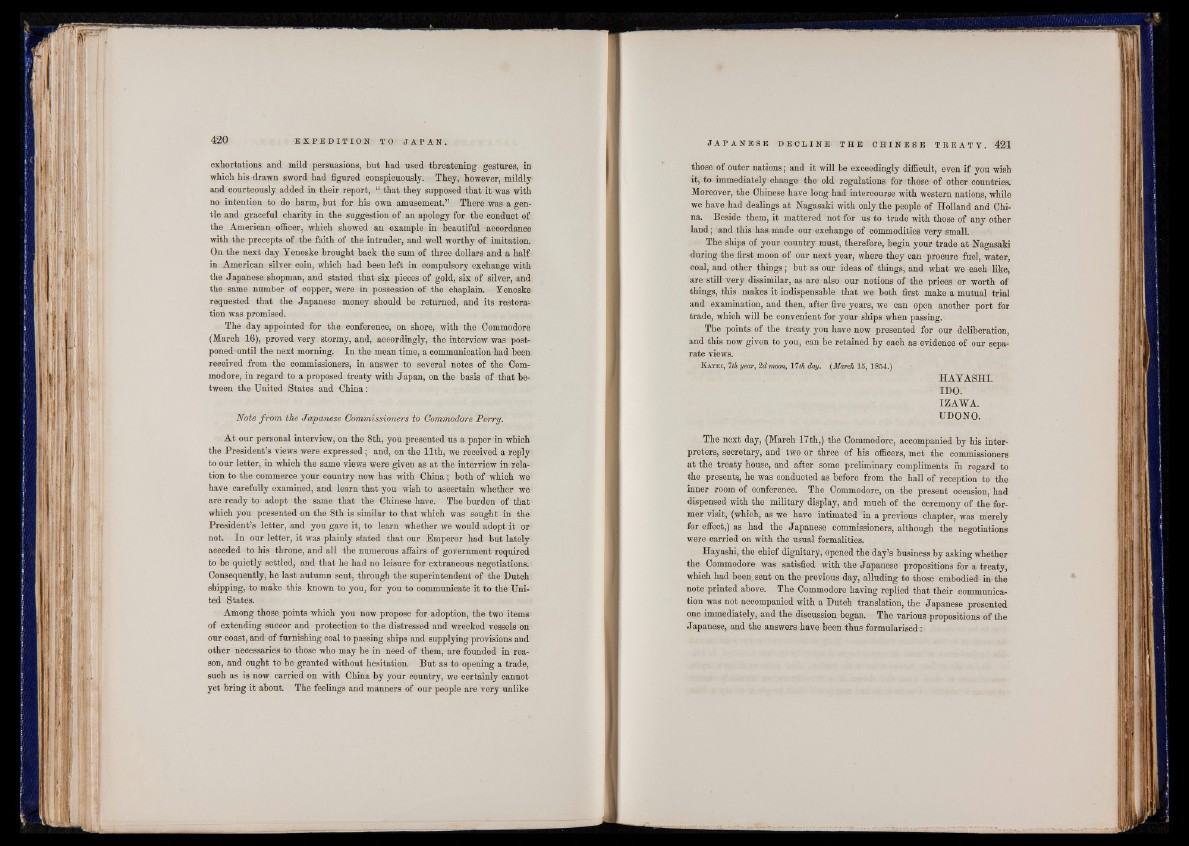
exhortations and mild persuasions, hut had used threatening gestures, in
which his drawn sword had figured conspicuously. They, however, mildly
and courteously added in their report, “ that they supposed that it was with
no intention to do harm, hut for his own amusement.” There was a gentle
and graceful charity in the suggestion of an apology for the conduct of
the American officer, which showed an example in beautiful accordance
with the precepts of the faith of the intruder, and well worthy of imitation.
On the next day Yenoske brought hack the sum of three dollars and a half
in American silver coin, which had been left in compulsory exchange with
the Japanese shopman, and stated that six pieces of gold, six of silver, and
the same number of copper, were in possession of the chaplain. Yenoske
requested that the Japanese money should be returned, and its restore
tion was promised.
The day appointed for the conference, on shore, with the Commodore
(March 16), proved very stormy, and, accordingly, the interview was post-
poned-until the next morning. In the mean time, a communication had been
received from the commissioners, in answer to several notes of the Commodore,
in regard to a proposed treaty with Japan, on the basis of that between
the United States and China :
Note from the Japanese Commissioners to Commodore Perry.
At our personal interview, on the 8th, you presented us a paper in which
the President’s views were expressed ; and, on the 11th, we received a reply
to our letter, in which the same views were given as at the interview in relation
to the commerce your country now has with China ; both of which we
have carefully examined, and learn that you wish to ascertain whether we
are ready to adopt the same that the Chinese have. The burden of that
which you presented on the 8th is similar to that which was sought in the
President’s letter, and you gave it, to learn whether we would adopt it or
not. In our letter, it was plainly stated that our Emperor had but lately
acceded to his throne, and all the numerous affairs of government required
to be quietly settled, and that he had no leisure for extraneous negotiations.
Consequently, he last autumn sent, through the superintendent of the Dutch
shipping, to make this known to you, for you to communicate it to thè United
States.
Among those points which you now propose for adoption, the two items
of extending succor and protection to the distressed and wrecked vessels on
our coast, and of furnishing coal to passing ships and supplying provisions and
other necessaries to those who may be in need of them, are founded in reason,
and ought to be granted without hesitation. But as to opening a trade,
such as is now carried on with China by your country, we certainly cannot
yet bring it about. The feelings and manners of our people are very unlike
those of outer nations; and it will be exceedingly difficult, even if you wish
it, to immediately change the old regulations for those of other countries.
Moreover, the Chinese have long had intercourse with western nations, while
we have, had dealings at Nagasaki with only the people of Holland and China.
Beside them, it mattered not for us to trade with those of any other
land; and this has made our exchange of commodities very small.
The ships of your country must, therefore, begin your trade at Nagasaki
during the first moon of our next year, where they can procure fuel, water,
coal, and other things; but as our ideas of things, and what we each like,
are still very dissimilar, as are also our notions of the prices or worth of
things, this makes it indispensable that we both first make a mutual trial
and examination, and then, after five years, we can open another port for
trade, which will be convenient for your ships when passing.
The points of the treaty you have now presented for our deliheration,
and this now given to you, can be retained by each as evidence of our separate
views.
Ka ye i, 7th year, 2d mom, 17ih day. (March 15, 1854.)
HAYASHI.
IDO.
IZAWA.
UDONO.
The next day, (March 17th,) the Commodore, accompanied by his interpreters,
secretary, and two or three of his officers, met the commissioners
at the treaty house, and after some preliminary compliments fn regard to
the present^ he was conducted as before from the hall of reception to the
inner room of conference. The Commodore, on the present occasion, had
dispensed with the military display, and much of the ceremony of the former
visit, (which, as we have intimated in a previous chapter, was merely
for effect,) as had the Japanese commissioners, although the negotiations
were carried on with the usual formalities.
Hayashi, the chief dignitary, opened the day’s business by asking whether
the Commodore was satisfied with the Japanese propositions for a treaty,
which had been sent on the previous day, alluding to those embodied in the
note printed above. The Commodore having replied that their communication
was not accompanied with a Dutch translation, the Japanese presented
one immediately, and the discussion began. The various propositions of the
Japanese, and the answers have been thus formularised: